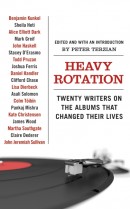From here on out, every Thursday on the blog will bring a post about a paperback book. This might be a book originally published in hardcover or — as with this week’s subject — being published for the first time in paperback.
 In Heavy Rotation: Twenty Writers on the Albums That Changed Their Lives
In Heavy Rotation: Twenty Writers on the Albums That Changed Their Lives, there’s a lot said about albums, and even more said about some writers’ lives. Several women in the collection attach their musical memories to external experiences: Asali Solomon’s thoughts about Gloria Estefan were influenced by a semester spent in the Dominican Republic with a friend ; Claire Dederer learned to love the great Hedwig and the Angry Inch
because her friend, a fellow mother, insisted they see it live; and Sheila Heti worshipped the Annie soundtrack and went to perform “Tomorrow” on a popular Canadian TV program. (“I longed to be in an orphanage,” Heti writes. “One afternoon, I demanded to be shown my birth certificate to determine my true parentage. Which turned out to be my parents.” Her entire piece can be read here.)
Men, on the other hand (and with several exceptions), are more concerned with what the music says about them. Benjamin Kunkel self-consciously sought out the Smiths “to induct me into the mysteries of sophisticated music for teenagers”; Joshua Ferris (somewhat miraculously) felt like a personal secret was betrayed when Pearl Jam’s Ten became big (that album was born big); and Mark Greif, writing about Fugazi, bemoans that, “Rock is for children. [. . .] By twenty-eight you’re left with the knowledge that you’re the fan of a deficient art form. Your emotions have evolved to deny you rock music’s best benefits, and it’s become much too late to develop any comparably deep feeling from any other music. As a grown-up, still listening to the same stuff, you’re genuinely ruined.”
Elsewhere, things are less morose. Martha Southgate contributes a timely appreciation of the Jackson 5, who made her feel less alone growing up as a Midwestern African-American; James Wood closely reads the Who’s Quadrophenia and explains the British battle between mods and rockers; and Peter Terzian, the collection’s editor, testifies on behalf of Miaow, a short-lived band from the ‘80s who caused Terzian to listen to Bob Dylan and the Beatles and think, “they’re no Miaow.”
The most substantive and best piece in the book is by John Jeremiah Sullivan. (Perhaps not a coincidence, it’s also the essay in which the author’s navel plays the smallest role, though, in fairness, navel-gazing is at least part of the collection’s point.) Commissioned for this book, the essay appeared in a different form in Harper’s. “O Black and Unknown Bards” tells the story behind American Primitive, Vol. II: Pre-War Revenants, a John Fahey-curated collection of 50 songs from 1897-1939. It’s a story of obsession, decoding and stunning music. The serious collectors who appear in it (“a community widespread but dysfunctionally tight-knit”) are the ones who live up best to the book’s subtitle. Music has changed their lives to the point that it has become their lives.
It has hits and misses, like any anthology, but Heavy Rotation will help you lovingly remember your own music-fan origin stories. (Mine would involve R.E.M., who go unchosen in the book.) As Dederer writes about growing up: “Music was how I made sense of my days. I imagine I am not unlike you in this.”

